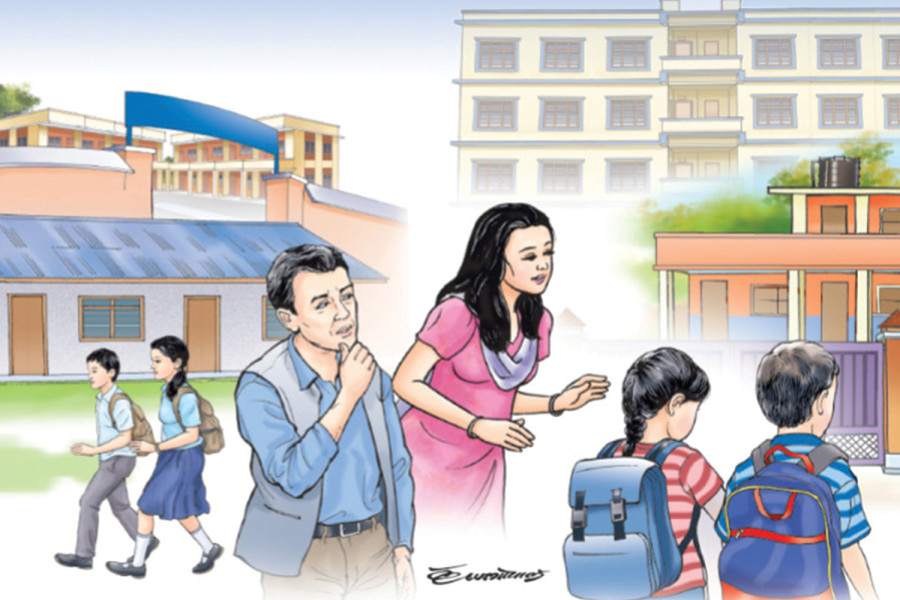National
KMC bars private schools from collecting admission fees from continuing students
Warns of legal action. But schools say law allows them to levy some charge annually.
Arjun Poudel
The Kathmandu Metropolitan City (KMC) has instructed institutional schools operating within its jurisdiction not to charge admission fees when they move up grades in the same school.
The KMC’s Education Department has also instructed schools not to charge new students more than a month’s fee for admission.
Issuing a statement on Friday, the KMC has said schools charging students in violation of the instructions will face legal actions.
“There have been complaints over some institutional schools operating in the metropolis charging additional fees.”
The city office reminded that the Kathmandu Metropolitan City School Education Act 2018, the Kathmandu Metropolitan City School Education Management Regulations-2018, and Rule 4.2.6 of Institutional Schools Criteria and Operation Directives-2013 prohibit schools from charging amounts other than the monthly fee of the respective class during new admissions.
Rule 4.2.7 of the same directive also prohibits schools from charging admission fees of students who are already enrolled in the same school.
“We will send school inspectors to schools and take legal action against any schools found charging additional fees,” said Deepak Adhikari, joint spokesperson at the metropolis. “This time we are committed to strictly enforcing the existing rules and regulations.”
Operators of institutional schools, however, claim that the law allows them to collect an annual fee every year—two months’ worth of monthly fees from existing students, and three months’ worth of monthly fees from new students.
“We don’t know if schools have charged more than what the law permits,” said DK Dhungana, president of Private and Boarding Schools’ Organisation Nepal (PABSON). “If schools have done so, the administrations of respective schools should be able to justify it.”
Some schools have also been charging a security deposit during the time of admission. Dhungana said schools are allowed to charge an amount equivalent to one month’s fee as security deposit.
Experts say it is the responsibility of the relevant agencies including local units to strictly enforce rules and regulations.
“The Kathmandu Metropolitan City has simply enforced the existing laws, rules and regulations. It is not doing anything new,” said Pramod Bhatta, an educationist. “Other relevant bodies including local units should also collaborate to enforce the law effectively.”
School admissions have become a nightmare for less well-off parents in Nepal. The apathy of agencies with grading schools has also left parents confused about the quality of education they provide.
Bhatta said some schools collect security deposits, but do not pay interest on the money, which is returned when students leave school. Some schools do not even return the security deposit if parents misplace the deposit vouchers.
Officials said that the warning is among the measures being taken by the KMC as it tries to improve school education. The KMC has also prohibited institutional schools from selling books, stationery and uniforms.
The metropolis had barred community schools operating within its jurisdiction from charging any fees to students.
The city office had recently issued a deadline at the end of March to institutional schools with foreign names operating within its jurisdiction to change their names within 35 days.
Officials said that over 200 private schools operating in the KMC have applied to the Education Department under the city office requesting some time for such name-change.
Officials said some schools have proposed new names, and others have promised to change their foreign names within the deadline set by the metropolis.
Officials said that schools should choose names having local relevance, such as renowned persons who have made significant contributions to the country, popular cultural icons, historical places, deities, religious mythologies, pilgrimage sites, and heritage sites.
The metropolis has also been training teachers to serve in community schools. Professors and experts from Kathmandu University are currently conducting a four-day training at 55 centres starting this Sunday, according to Shailendra Jha, a member of the City Planning Commission.
Officials hope the skill training for teachers will help improve the quality of education, the learning outcome in government schools and make students there more competent.
The City office earlier this month had signed a memorandum of understanding with the Kathmandu University for capacity building of teachers, and conducting a study on the effectiveness of teaching-learning and child psychology, among others. For this, the metropolis has allocated over Rs28 million to Kathmandu University.
The City office has already started book-free Fridays, in which people’s representatives from many local governments have shown interest.
Under the programme, students from grades 9 to 12 are taught optional short-term courses covering topics including agriculture and urban farming, cosmetology, carpentry and wood-carving, culinary arts, fashion design and clothing, electrical wiring, disaster preparedness, mobile and electronics repair, plumbing, stitching, and sculpture.
The metropolis has also introduced an integrated curriculum for grades 1 to 3, under which the knowledge of interlinked subjects are provided.
Officials said that they are incorporating extracurricular activities—music, poem recitation, essay writing, plant-growing, and waste management, among other skills—into the curriculum of grades 4 to 8 for mental and physical growth of students.




 8.22°C Kathmandu
8.22°C Kathmandu














